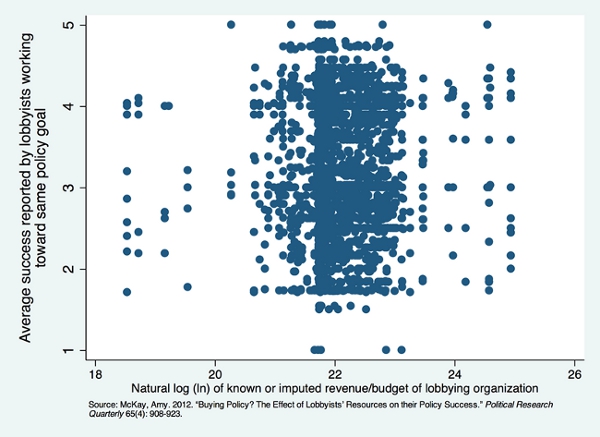For lobbyists, money doesn’t buy policy, but it can buy things that help achieve policy goals
One of the most common critiques of the lobbying of government and legislators by interest groups is that the more money organisations have the more influence they are able to ‘buy’. Using one of the largest surveys of lobbyists ever conducted Amy McKay investigates this claim, and looks at the success of lobbyists based on various factors, including finance. She finds that wealthier interest groups do not necessarily have greater public policy successes. She argues that the lobbyists that have greater success are those that have more experience in government and lobby in more venues, both of which can be (but are not necessarily) linked to greater organisational wealth.
While it is a trite cliché that money buys public policy influence, the extent to which it actually does is something that is notoriously difficult to test for. In studies that seek to test the extent of the relationship, the sample size is often too small, the effects are too hard to measure, and a causal relationship impossible to confirm. In my research, I have addressed these challenges by using a relatively large sample size with three measures of “influence” and without asserting a causal relationship. The results indicate that having money alone does not make a lobbying organisation more successful—but having more money is linked to certain lobbying tactics and traits, and some of these are associated with greater policy success.
The data for the study come from the largest survey ever conducted of lobbyists combined with new data I gathered about the resources of the lobbyist’s employer. Nearly 800 lobbyists discussed up to 5 policy proposals they worked on, for a total of more than 3000 observations across 77 issues. Three measures were used to capture “influence”: the lobbyist’s own assessment of success on the issue, the average success reported by all lobbyists working for the same policy goal, and a new determination of whether or not the policy proposal became law. Several possible means of “buying” policy were considered: an organisation’s finances, the advantages business interests have over public interests, lobbyists’ experience and connections, and the intensity of lobbying effort.
Finances
As Figure 1 shows, contrary to popular belief, the analysis indicates that greater financial variables do not directly help lobbyists’ chances of achieving their policy goals. Neither the organisation’s income, the number of group members, whether the group has a political action committee (an organisation that pools campaign contributions), nor the receipts of any PAC, predict greater success—measured three ways—in a statistically significant fashion.
Figure 1 – Relationship between lobbyists’ resources and policy their success

Business interests
Relative to other lobbyists, business lobbyists have many traits that suggest they would be more successful: higher incomes, more time spent on policymaking, more years of experience in government and as lobbyists, former colleagues in the administration or on Capitol Hill, involvement in a political action committee (PAC), and working for an office that has been in D.C. longer. But importantly, these seeming advantages do not equate to greater policy success.
Business lobbyists are no more likely than public interest lobbyists to achieve their desired outcome. Despite this, lobbyists for business—and higher-income lobbyists generally—report significantly more success than public interest lobbyists. In other words, it appears they believe they are more successful than they are.
Experience and connections
Numerous indicators of experience and connections also do not predict policy success: the number of years at the current organisation, having a graduate degree, having been an elected official, and age do not matter; even having congressional experience or more years of government experience does not make lobbyists more successful. Again, though, lobbyists with greater experience and connections make lobbyists feel more successful.
While experience and connections alone do not help a lobbyist achieve her desired outcome, greater money can in some cases buy more experienced or better connected lobbyists who achieve greater success. For example, having former colleagues on Capitol Hill or at the White House, or having been a lobbyist for longer, have positive effects on success. Meanwhile, other indicators of experience or connections reduce the odds that such lobbyists are on the winning side of a proposal (being a lawyer or contract lobbyist, and working for a firm that has been in D.C. longer). This counterintuitive finding suggests that more experienced lobbyists are hired when success is seen as more difficult to realize.
Lobbying intensity
Individual hard work does not seem to pay off in helping a lobbyist achieve her policy goals. The number of hours worked per week, the portion of the lobbyist’s time spent on public policy, and whether the lobbyist lives in D.C. do not affect lobbyists’ policy success. Even when an employer sends more lobbyists to work on an issue, those lobbyists are not more successful—suggesting that flooding Congress or agencies with lobbyists is not a strategy that benefits wealthier groups.
Lobbyist success is enhanced, however, when lobbyists contact Congress, when they contact federal agencies, and when they lobby in more venues; and lobbyists whose employers have more money are more likely to contact these institutions and to lobby in more venues (Congress, agencies, courts, or the public). Thus, lobbying is more effective than not lobbying, and groups that have more money are more likely to lobby in a given venue.
Other variables describing lobbying intensity are linked to greater lobbyist success but are not associated with greater organisational wealth, for example: having contacts on Capitol Hill or in the administration, working more hours per week, living in D.C., spending more days in D.C. per month, and spending a greater percentage of time on federal matters.
Greater financial wealth does not automatically lead to greater public policy success. There are a few things that greater money does tend to buy, and a few of these are linked to greater success: more experience in government and/or as a lobbyist and actively lobbying in more venues (Congress, agencies, courts, public appeals) are linked to greater money and greater success. But saying that a lobbyist’s occupational experience and the number of institutions they lobby help them achieve success—even if these are greater when an organisation’s wealth is greater—is a long way from saying that money buys public policy.
—
Note: This article is based on the paper “Buying Policy? The Effects of Lobbyists’ Resources on Their Policy Success” in the December 2012 issue of Political Research Quarterly. It gives the views of the authors, and not the position of Democratic Audit, nor of the London School of Economics. It was originally posted on USApp, American Politics and Policy at the LSE and can be found here. Please read our comments policy before commenting The shortened URL for this post is: https://buff.ly/1cyzoLi
—
 Amy McKay is Senior Lecturer in the Department of Politics at the University of Exeter. She studies interest groups, lobbying, policymaking and the U.S. Congress. She has previously worked on Capitol Hill and for the White House, and taught at several American universities.
Amy McKay is Senior Lecturer in the Department of Politics at the University of Exeter. She studies interest groups, lobbying, policymaking and the U.S. Congress. She has previously worked on Capitol Hill and for the White House, and taught at several American universities.







 Democratic Audit's core funding is provided by the Joseph Rowntree Charitable Trust. Additional funding is provided by the London School of Economics.
Democratic Audit's core funding is provided by the Joseph Rowntree Charitable Trust. Additional funding is provided by the London School of Economics.
For lobbyists, money doesn’t buy policy, but it can buy things that help achieve policy goals : Democratic Audit UK https://t.co/hX3V4CnzdG
For lobbyists, money doesn’t buy policy, but it can buy things that help achieve policy goals https://t.co/kWTELsKB28